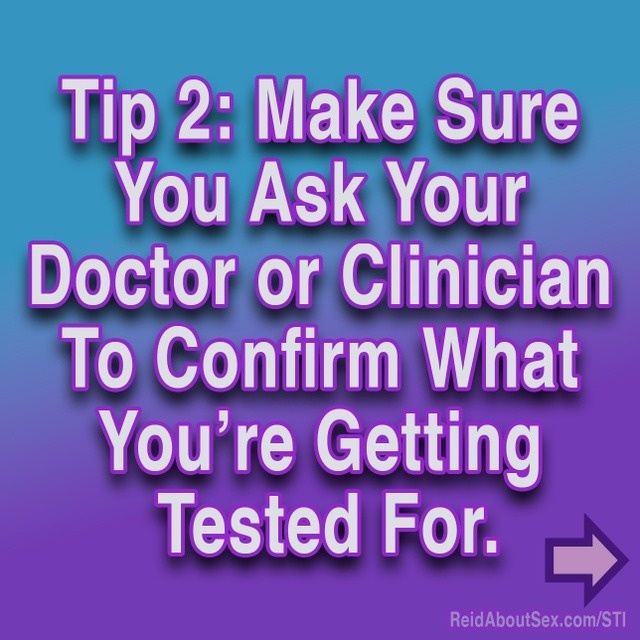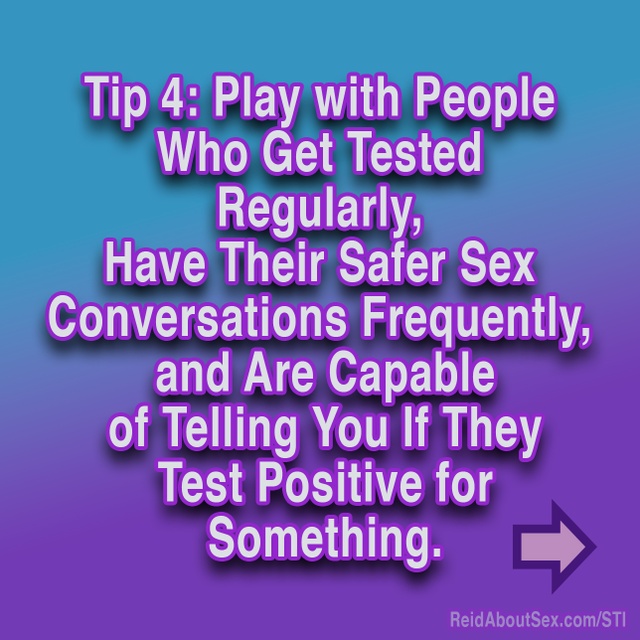4 Tips for Getting Tested and Having the Safer Sex Talk
Hey Sex Geek!
You might not know this but I regular get an STI screening and share my test results on social media. Why you ask? To encourage folks to get tested. I know, shocking!
Truth be told, I get a lot of positive feedback from folks saying how destigmatizing it is to see me sharing so openly and publicly about a topic that is so mired in shame, silence, and embarrassment.
And since you’ve been so generous as to spend your time on my blog, I thought I’d share with you the post I made which includes my 4 Tips for Getting Tested/Having the Safer Sex Talk.
I hope you find these tips helpful! I had a lot of fun making the images to post on Facebook and Instagram (Links to those posts below).
Please feel free to share this article with a friend or anyone you think might benefit from this geekery.
Geekily yours,
REiD
Ps. You don’t need to post your results on social media to be a good human. You have a right to your privacy. You. Do. You. This is just how I do me. ❤️


If you’re a burgeoning #sexgeek, there are a lot of ways to approach getting tested, having safer sex, as well as sharing safer sex conversations. Here are my four favorite tips, plus a fancy screenshot of my most recent results. If you feel called to, please Leave a Comment and share how YOU approach getting tested and “having the talk.” I’d love to hear from you!
TL;DR — Reid’s 4 Tips:
Tip 1. If you can, get tested at least twice a year. (3 or 4x If you’re very active.)
Tip 2. Make sure you ask your doctor or clinician to confirm what you’re getting tested for.
Tip 3. Have your safer sex conversations frequently. I recommend every time you have sex if you have been with more than one person.
Tip 4. Play with people who get tested regularly, have their safer sex conversations frequently, and are capable of telling you if hey test positive for something.
If you’re looking for info on what to say during a safer sex conversation, check out ReidAboutSex.com/STI for more info on my Safer Sex Elevator Speech!

The 4 Tips with More Context + Fancy Slides…
My advice with fancy slides (which you can share via Instagram or Facebook) and more context…


Tip 1. If you can, get tested at least twice a year. (3 or 4x If you’re very active.)
Why? So many of us grew up with shame and stigma around STIs and STDs that exercising our courage muscles and getting tested regularly helps make it a habit.
Think about how many of us don’t make a habit of going to the dentist? Dental shame is a thing, and I think sexual shame and stigma might be even more powerful since most folks have gone to the dentist at least once, but some people have yet to get an STI test.
Over time, building empowering habits can build self-confidence and raise self-esteem, which can make things more relaxing and less stressful. Remember, feeling confident doesn’t mean you NEVER feel nervous, awkward or ashamed. I still get nervous every time I’m waiting in the doctor’s office to get tested, but it’s become less and less nerve-racking over the years.
I also think it’s hard to make something a habit and build self-confidence/esteem when you only do it annually. That’s my opinion. Your mileage may vary. FYI, I get tested 3 to 4 times a year since I am quite promiscuous. I would like to know sooner if I test positive for something so I can let my lovers know and we can take effective next steps — Many STIs are treatable and only do severe damage when left untreated, so knowing sooner than later can make a world of difference! Also, it might make newer lovers feel safer knowing that you were more recently tested and have more current info since the previous test, especially if you’ve been playing with multiple people since that previous test.
Tip 2. Make sure you ask your doctor or clinician to confirm what you’re getting tested for.
There are lots of thoughts and perspectives on what to get tested for. I won’t get into it here in this post, but practicing speaking up and confirming what you’re getting tested for is ALWAYS a great thing to do.
As you get more comfortable talking about STIs, you might also get more comfortable researching and nerding out on STIs and testing… Then, maybe you grow more comfortable talking to your doctors or other folks who specialize in these topics and asking about their thoughts and recommendations… And that path leads you to having your own informed ideas on what your needs are around testing, feeling more confident about speaking up about those needs, and increasing your abilities to advocate for yourself rather than staying silent and just “going with the flow” because talking about STIs is “dirty” and embarrassing. #AdvocatingForYourselfAchievementUnlocked!

Since so many folks have asked in the comments of my Instagram and Facebook posts, “What do you usually get tested for, Reid?”, here’s a short list…
[I realize not everyone is in a position to get all of these tests, and not everyone needs to get all of these + there may be other tests you want to get… (Ps. I am not a doctor, nurse, or scientist, nor do I play one on TV. I also don’t have a vagina, so I don’t get pap smears.)]
When I get tested, I always ask to get tested for:
- Chlamydia and Gonorrhea, Syphilis, HIV – via blood draw and urine samples.
If it’s available, I also ask if I can…
- Get site-specific swabs orally and rectally to test for Chlamydia and Gonorrhea (since those won’t show up in the urine test).
When I am paying for an STI test (as opposed to going to my primary care physician or a free clinic), it’s often cheaper to purchase the “full panel” of tests than order them a la carte, and they will often include…
- Testing for Hepatitis A, B, and sometimes C — I’ve been vaccinated for Hep A & B, so those tests aren’t necessary, but they’re included in the full panel.
- Testing for HSV 1 and 2 (Herpes 1 & 2) — I have Herpes 1. The outbreaks present on my lower lip, and I’ve only ever had one outbreak that I know of. Many doctors do not routinely test for herpes when you ask for an STI test, so you’ll have to ask for it.
There are lots of thoughts and feelings about testing for herpes and I won’t get into them here. However, I will say, if you’ve never been tested for herpes, especially if you’re scared to do so, consider informing yourself more on the topic and talking to someone who is informed, sex-positive, and non-slut shaming about herpes since sexual/STI shame and stigma (especially around herpes) can often be alleviated or lessened if you’re willing to work on it.
Being uninformed about herpes and having that fear and stigma “rule your life” is not something that I wish for anyone.
If you want to talk to me 1:1 about any of these topics or relationship/sexual self-confidence-related things, please check out my coaching page HERE. I love helping people like YOU feel less scared and MORE empowered around sex & intimacy!


Tip 3. Have your safer sex conversations frequently. I recommend every time you have sex if you have been with more than one person.
You’re not a bad person if things get hot and heavy fast and you find yourself canoodling before you have “the talk.” However, I recommend pausing the sexiness and having a quick safer sex check-in.
Many people hesitate to “have the talk” because they’re afraid it’s going to ruin the moment, and I totally get it. I used to think that, too. And I still feel the echoes of those fears when I need to hit pause and have a check-in.
Annnnnnnnd, if having a check-in about sexual health and your/their needs around it ruins the moment such that you can’t reenter (pun intended) the sexiness, then maybe it was a good idea the moment got ruined. Just my $.02.
Even Better: Get savvy and comfortable with your safer sex conversation such that you can be the one to start the conversation before “the sex” starts happening.

So many people know they’re supposed to have “the talk,” but were never taught what to say. And since we’re all worried that we’ll ruin the moment, we often wait for the other person to initiate; however, they are in the same boat! They’re waiting for YOU to start!
I created the Safer Sex Elevator Speech so I could make having “the talk” feel smoother and less awkward, and so I didn’t have to reinvent it every time from scratch.
Want me to walk you through the handout so you can learn what the P.L.E.A.S.U.R.E. acronym stands for? You can support my work and support your sexual savvy by checking out the Walk-Through Video I made HERE.
The Elevator Speech has helped thousands of people have easier, smoother, hotter safer sex conversations and maybe it will help you or a loved one!
Ps. There are lots of ways to have a safer sex conversation, BTW. And the only way to get it “wrong” is to never have it at all.
Tip 4. Play with people who get tested regularly, have their safer sex conversations frequently, and are capable of telling you if hey test positive for something.
How do you know if the people you’re having sex with can fulfill on Point #4? I think having your safer sex conversations with them is an excellent indicator!
You can tell a lot about a person from how they handle “the talk.” It doesn’t mean that they (or you) have to be all suave and get the talk perfect, but having the conversation can help you figure out if they have their words, know what their status is and testing habits are, AND can communicate their wants/needs/desires/boundaries around their sexual health.
There is no such thing as completely safe sex. And even the best of us make mistakes, get scared, or break our good habits from time to time. However, how someone handles having a safer sex conversation and when/for what/how often they get tested can help you figure out what you need from them in order for the two (or more) of you to feel safer — emotionally, physically, and spiritually/energetically — playing together.

In Summary: Why Points 1 thru 4 Add Up To Healthier Sex (Which is often BETTER Sex)…
The reason getting tested regularly, advocating for yourself + frequently having your safer sex talks with people who are ALSO getting tested regularly, advocating for themselves, and ALSO having their safer sex talks is SO important is this…
Folks who make these behaviors habitual in their lives are more likely to notify you if and when they test positive for something. And you’re more likely to notify them. NOT getting tested means NOT knowing your status. And NOT being able to have safer sex conversations increases the possibility that shame and silence will keep us from being able to take effective action when it comes to our sexual health.
An added bonus is if all of your loved ones are getting tested regularly and keeping everyone in the loop, it means you all find out sooner if and whenever any of you test positive. Example: If you’re not due to get tested for 2 months, but a recent lover of yours is getting tested next week… If they test positive for something and let you know, that just gave you seven weeks of advanced notice that you may have been exposed to something! And since you are a pro at getting tested, you can head over to your doctor or clinic to take next best steps. Boom! #SexGeekPowersActivate!

People who make these behaviors habitual, may also be more inclined to speak up during sex and ask for what they want or tell you when they need an adjustment or have changed their mind… And maybe you will speak up, too. It’s not a guarantee that the sex will be better, but it does stack the deck in everyone’s favor, wouldn’t you agree?
These four points I’ve shared are only the beginning of many other points YOU might want to create for yourself. And maybe my four points don’t resonate with you. But if you got this far in reading this, I’m excited for you and what you’ll create for yourself in and out of the bedroom. Thanks for being curious and for valuing your sexual health, and thanks for being you, {{first_name}}!
Ps. Leave a Comment and tell me what you think! I can’t always reply to every comment, but I read them all, and I’d love to hear from you.
Pps. If you’d like to get more tips and know-how, including my favorite Star Trek-themed bedroom move, just Click Here or follow this link:
reidaboutsex.com/vulcan



